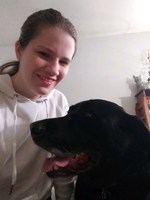Knowing what puppies can and can’t eat can be difficult, especially for first-time dog owners. Many foods that we eat daily can be harmful or toxic to them, so it’s important to do thorough research and to speak to your veterinarian if you have questions.
Today I’ll answer some common questions about what puppies can and can’t eat in detail, but to give you a quick rundown:
- Puppies can eat grass, carrots, bananas, apple slices, xylitol-free peanut butter, eggs, bread, and cheese.
- Puppies can’t eat apple cores or seeds, peanut butter that contains xylitol, raw eggs, or popcorn.
- Puppies shouldn’t eat adult dog food as a meal, but it won’t hurt them if they get into it on their own.
Always check ingredient listings to ensure that the food you’re giving your puppy doesn’t contain toxic ingredients. Some of these are obvious, while others may be more “hidden.”
A few examples are raisin bread, cheese that contains garlic, and the sweetener xylitol that can be found in peanut butters, dessert breads, and other sweets.
Puppies Can Eat Grass
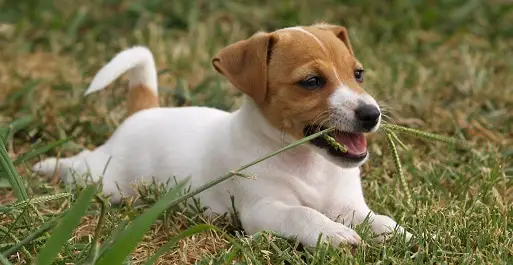
Puppies can eat grass, and it aids in good digestion. If your puppy is eating grass and also has an upset stomach, you should bring them to the veterinarian. Make sure your puppy is on a parasite preventative and that the grass hasn’t been treated by pesticides, herbicides, or fertilizers.
Puppies may eat grass for the following reasons:
- For fiber, which aids their digestion
- They have an upset stomach due to a medical problem or eating something bad
- Your puppy is bored and needs more stimulation and exercise throughout the day
- They are obsessed with eating grass
- Your puppy feels anxious
While it’s safe for puppies to eat grass, they should be doing so in moderation. If they seem obsessive or are constantly grazing whenever they’re outdoors, you should bring them to the veterinarian for a check-up.
The same goes if your puppy is showing other symptoms or odd behavior, such as not eating their normal food.
Some people believe that eating grass means a puppy is trying to induce vomiting, but this isn’t true. Most puppies don’t throw up at all after eating grass. If your puppy does so regularly, it’s time to see the vet.
Be extra cautious that the part of your lawn where your puppy spends time isn’t treated by pesticides, herbicides, or fertilizers. These could poison your pup.
It’s also best not to let your puppy eat grass from other people’s lawns or public spaces, since you don’t know how the grass has been treated.
Puppies Can Eat Carrots
Puppies can eat carrots. Both cooked and raw carrots are okay to feed puppies as a snack. They’re nutritious and you’ll even find them as an ingredient in many dog foods.
Be sure to clean and chop carrots before feeding them to your pup, just like you would when prepping them for your family.
It’s also a good idea to cut carrots down the center long-ways. Round foods are a choking hazard, and cutting carrots this way makes it so that the pieces aren’t going to get caught in your puppy’s throat and block their airway.
Chop the carrots into bite-sized bits to prevent choking further.
Of course, everything should be fed in moderation. While carrots make a good snack, you should be feeding your puppy primarily with quality puppy food.
Puppies Can Eat Bananas as an Occasional Treat
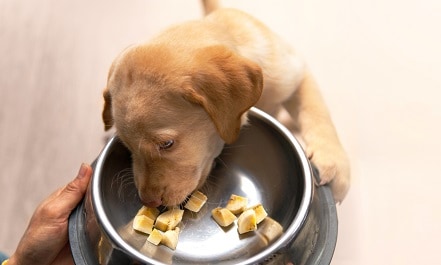
Puppies can eat bananas as an occasional treat, but they shouldn’t have too many. The natural sugars in bananas and other fruits can be bad for puppies when eaten in excess. Try feeding them a few bites rather than an entire banana.
Always peel your bananas before serving them to your pup. The peels aren’t toxic, but they might upset your puppy’s tummy.
You also shouldn’t feed your puppy bananas for nutritional purpose, but instead as an extra snack or treat. Their puppy food should supply enough nutrients on its own.
Some puppies don’t enjoy bananas. My dog Charlie has hated bananas since we brought him home! He just won’t touch mushy foods.
If your puppy is like mine, Purina recommends trying frozen bananas if your pup won’t eat them fresh.
Charlie might have a new snack to try this summer!
Bananas for Short-Term Diarrhea in Puppies
Some people feed puppies bananas when they are having stomach problems such as upset stomach or diarrhea. This can be a solution, but it’s tricky.
Too much banana could cause constipation for your puppy. In addition, bananas are only a solution for short-term stomach problems.
If your puppy has diarrhea or an upset stomach for longer than one day, you should make an appointment with your veterinarian to find out what’s causing the problem.
Diarrhea can be a symptom of serious medical problems such as parasites or infections. Watch for other symptoms such as bloody stool, black stool, throwing up, pain, fever, or pale gums.
If your puppy has an upset stomach due to eating something toxic, contact your veterinarian or a poison control hotline right away.
Puppies Can’t Eat Whole Apples
Puppies can eat apples, but not the pit. For this reason, you should never give your puppy a whole apple to munch on. Instead, cut the apple into bite-sized pieces and make sure the core, stem, and seeds are removed. If your puppy ingests the core or seeds of an apple, contact your veterinarian.
You might also consider peeling the apple to help your puppy eat it more easily or to remove some fiber for pups with sensitive stomachs. This isn’t required, however.
Be sure to wash apples before feeding them to your puppy to remove any harmful pesticides. Just like humans, puppies should only consume washed fruits and vegetables.
If your puppy gets ahold of an apple and eats the pit or seeds, you should contact your veterinarian immediately.
A small amount likely won’t hurt anything, but large quantities can lead to cyanide poisoning–and for small dogs and puppies, it takes less to affect them than for larger dogs. It’s better to be safe than sorry.
Puppies Can Eat Peanut Butter
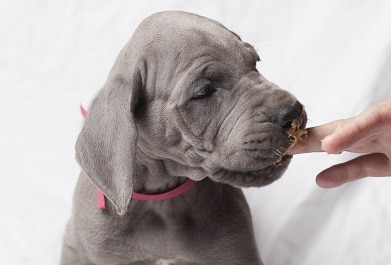
Puppies can eat small amounts of peanut butter at around five to six weeks old. It’s a favorite snack for many pups, but be sure to avoid peanut butters with toxic ingredients such as the sweetener xylitol and chocolate. Peanut butter should only be fed in moderation.
The two things to watch out for are peanut butters that include xylitol and chocolate. These are both very toxic to dogs and could potentially lead to death, especially in a small puppy.
Xylitol is a sweetener that is often used as a sugar substitute in human food. It’s fine for us to eat, but not for our pups.
Once you’ve chosen a peanut butter that’s healthy for your puppy, you can feed it to them in small amounts as an occasional treat.
Peanut butter contains natural fats that are good for your puppy in moderation, but in excess can cause health problems or lead to a chubby puppy.
Especially for small breeds or breeds that can’t handle excess weight, keep an eye on how much they’re eating.
Puppies Can Eat Eggs
Puppies can eat eggs in moderation, like with any other treat. Eggs are a great source of protein, vitamins, and linoleic acid. However, puppies should never eat raw eggs as they can get Salmonella the same as people.
You can prepare eggs in any way so long as they are cooked. My dog Charlie loves the occasional hardboiled egg, which he typically tears apart to eat yolk-first!
It’s best not to add any seasonings, butter, oil, or sauces, and you should look into these separately if you have included them to ensure they’re okay for puppies to eat.
The main benefit of eggs is protein, followed by vitamins and linoleic acid, which helps to sustain a healthy coat and immune system.
Although eggs are healthy for puppies, they shouldn’t be eating whole eggs regularly. The majority of your puppy’s calories should come from a high-quality puppy food.
Egg shells should only be fed to your dog if recommended by your veterinarian, and is typically only suggested for dogs with arthritis.
Calcium is very important for dogs’ health, but there’s usually a better way to get it—such as through their food or a calcium supplement.
Puppies Can’t Eat Raw Eggs
Puppies can’t eat raw eggs due to the risk of Salmonella. If your puppy develops Salmonellosis, this could also put you at risk of infection. Symptoms for both puppies and humans include fever and digestive problems such as cramps, diarrhea, and upset stomach.
Although some people do feed raw eggs to their dogs, it’s not without its risks. You should speak to your veterinarian to make the best choice possible for your puppy.
Salmonellosis is an infection that is most commonly transmitted when you eat food that contains raw eggs. According to the CDC, it can also be spread very rarely via contact with an infected animal or person.
Other risks to consider are biotin deficiency and bacteria from eggs that have gone bad.
If your puppy has eaten raw egg by mistake, keep an eye on them and contact your veterinarian if any symptoms arise.
Puppies Shouldn’t Eat Adult Dog Food
Puppies shouldn’t eat adult dog food until they are fully grown. For most pups this happens at around one year of age, but it varies based on breed. Choosing a high-quality puppy food will help your pup to grow up healthy and get everything they need from their food.
I definitely used to think that all dog foods were the same and that grouping them by age was a simple marketing tactic. However, I’ve since learned this is untrue.
Puppies need different nutrition than adult dogs because they are still growing, and thus need more calories and essential nutrients in order to grow healthily.
Other groups that need special foods are nursing or pregnant dogs, senior dogs, and those with certain health problems.
Some giant breeds need to eat puppy food until up to two years of age, but most breeds are considered fully grown by around one year.
If you’re unsure which puppy food to choose or how long your puppy should continue to eat puppy food, ask your veterinarian. They can give you the best advice that is tailored directly to you and your pup.
Adult dog food isn’t in any way toxic to puppies, and it’s okay if you catch them eating from your grown dog’s dish.
If this happens, simply separate your dogs better during their next meal so that your grown dog gets their entire meal and your puppy isn’t overfed.
Puppies Can Eat Small Amounts of Bread
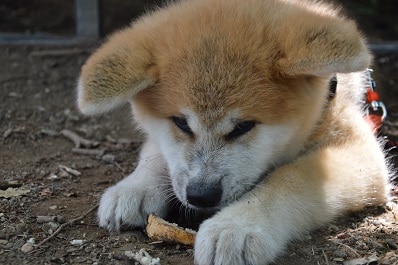
Puppies can eat small amounts of bread as a treat, but it’s not healthy for them and doesn’t provide any nutritional benefits. If you choose to feed bread, stick to plain white or wheat, and check carefully for ingredients that are toxic to dogs. Never feed your puppy unbaked dough.
Purina points out that dessert breads are a bad idea for pups. They often contain toxic ingredients such as chocolate, raisins, or the sweetener xylitol.
Bread dough can also be incredibly harmful as it can expand inside of your puppy’s stomach once consumed. If your pup eats bread dough, you should call your veterinarian.
Otherwise, feeding your puppy small amounts of plain bread, such as the white bread from your sandwich is perfectly okay. Just watch that you aren’t feeding them too much.
If your pup has any reaction to the bread such as an upset stomach, stop feeding it to them. Some dogs are allergic, or bread simply doesn’t agree with their stomachs.
For example, my dog Charlie can’t tolerate bread and will throw up if it’s fed to him.
For this reason, puppies with sensitive tummies shouldn’t be fed bread as a precaution.
Puppies Can Eat Cheese
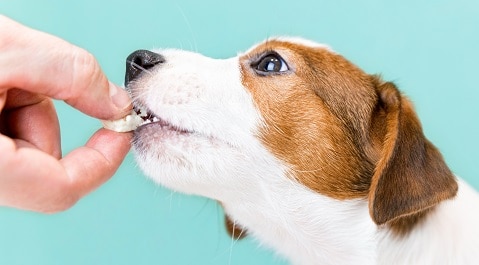
Puppies can eat cheese, and it’s often a favorite treat. While cheese provides many nutritional benefits, your pup should primarily get their nutrients from a high quality puppy food. Too much cheese can lead to an upset stomach or weight gain.
If your puppy has symptoms such as an upset stomach after eating cheese, you should stop feeding it to them. Some dogs are lactose intolerant.
Lastly, you should always check the ingredient list to ensure nothing toxic to dogs is listed. Some cheeses contain garlic, onion, or chives; all things you should avoid feeding your pup.
So long as the cheese doesn’t include these ingredients and you’re feeding it in moderation, it can be an excellent and motivating treat.
My dog’s favorite food is cheese, and we use it to keep him motivated during tasks that are hard for him, like heeling during a walk.
Puppies Shouldn’t Eat Popcorn
On the surface popcorn seems like a good treat, but puppies shouldn’t eat popcorn due to the choking hazard it presents. Kernels can get caught in your pup’s teeth or throat, causing them harm. If you do feed your pup popcorn, do so in moderation. Air pop it and don’t add any toppings.
This keeps the popcorn as healthy as possible for your pooch.
So long as they don’t choke on the popcorn kernels and don’t eat too much, popcorn won’t harm your puppy.
However, the kernels do pose a choking risk especially with small pups. That’s why I recommend avoiding popcorn altogether.
A great alternative is to prepare a puppy-proof snack and keep it on hand during your next movie night in. There are dog-safe popcorn recipes if you want to try your hand at those, or you can go with simpler options like store-bought treats or scraps of cooked, unseasoned meat.
Writer: Katelynn Sobus
